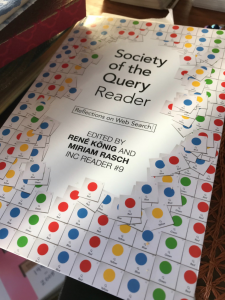“We run the risk, with social news algorithms,” Czech media philosopher Vilém Flusser wrote, “of losing our human capacity to select information, an essential part of making decisions, of being free.” (From the Society of the Query Reader: Reflections on Web Search)
 That’s a powerful way of saying it. Making decisions is the essence of freedom, and selecting which information to focus on is a particularly important kind of freedom in an information-dense world. As is the case with so many other forms of freedom, it’s also overwhelming and frightening. Exercising it is a skill that we (hopefully) build. (Mortimer Adler defines a skill as “a habit of following a set of rules,” in his great book How to Read a Book (video summary).)
That’s a powerful way of saying it. Making decisions is the essence of freedom, and selecting which information to focus on is a particularly important kind of freedom in an information-dense world. As is the case with so many other forms of freedom, it’s also overwhelming and frightening. Exercising it is a skill that we (hopefully) build. (Mortimer Adler defines a skill as “a habit of following a set of rules,” in his great book How to Read a Book (video summary).)
I like to exercise my information freedom through source selection (following specific people, subscribing to RSS feeds), source categorization (making Twitter lists, folders in my RSS reader), reading the most recent updates from those sources, AND appreciating social news algorithms that bring selected updates to the top. Today I retweeted my wife for the first time in a long time, because Twitter’s “You may have missed” algorithm made sure I saw her post. I appreciate that.
Flusser’s exploration of the implications of these algorithms goes into more detail. “For example,” he says, “redundant info isn’t removed, but highlighted, creating pressure to conform.”
If freedom is important to you, looking outside the boundaries of the algorithmic stream is important.